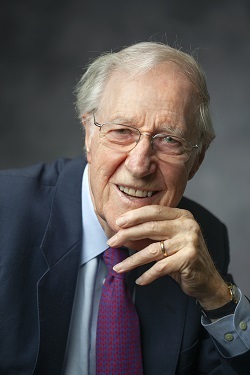 Influential palaeontologist, teacher, administrator and policymaker who achieved international prestige
Influential palaeontologist, teacher, administrator and policymaker who achieved international prestige
Frank Rhodes was the archetypal English gentleman and scholar. He made important original contributions to palaeontology and achieved international prestige as a university teacher, administrator and policymaker, especially in the United States, where he became a citizen and pursued most of his long and distinguished career.
Education and early career
Born in Warwickshire, Rhodes was awarded three degrees by Birmingham University: BSc (1948), PhD (1950) (on conodonts, then a poorly known microfossil group) and DSc (1963). He won a Fulbright Scholarship, spent at the University of Illinois (1950-51), then taught at the University of Durham (1951-54).
He returned to Illinois as Assistant, then Associate Professor (1954 - 1956) and was appointed to the Chair of Geology in the University College of Wales, Swansea in 1956 at the exceptionally young age of 29. In 1965 he was awarded a Visiting Research Fellowship by the U.S. National Science Foundation, which he spent at Ohio State University. In 1967 he was elected Dean of Science at Swansea and also was recipient of the Geological Society’s Bigsby Medal for that year.
These periods of transatlantic peregrination were clearly beneficial to Rhodes’ research, now focussed on the systematics, biology and biostratigraphic value of conodonts, complementing his expanding interests in broader evolutionary topics. The links established then also provided research opportunities for a growing cluster of research students and postdoctoral fellows, including several from North America. They also led to long and fruitful collaboration with leading American palaeontologists and biostratigraphers, such as Harold Scott and Charles Colllinson, several of whom spent sabbatical periods at Swansea during his 12 years tenure there.
Michigan and Cornell
In 1968 Rhodes accepted an invitation from the University of Michigan (Ann Arbor) to join them as a Professor in the School of Geology and Mineralogy. He became Dean of their College of Literature, Science and the Arts in 1972, and served as Vice-President for Academic Affairs at Michigan from 1974 until 1977, when he accepted the invitation to become President of Cornell University, where he was to remain until his official retirement in 1995 (as the longest-serving University Head in the Ivy League).
His time at Cornell was marked by innovation, enterprise and inclusiveness, significantly expanding the degree courses offered and enhancing recruitment of female and minority-group students and staff, alongside a much expanded range of the research topics pursued, all accomplished through greatly increased external funding. He also built or strengthened academic links for Cornell with many overseas universities and research institutions, from Saudi Arabia to Cambridge, Hong Kong to Oxford, and was awarded some 35 honorary degrees and fellowships, conferred on him by universities and similar bodies in around 15 countries.
Externally, he became an influential member of the US National Academy of Sciences and was consulted on academic and scientific policy matters by four US Presidents. His eloquence and ability to convey complex concepts and ideas to lay audiences meant that even in retirement he was greatly in demand as a speaker both in the USA and internationally.
Important contributions
Throughout his long career at Cornell, Rhodes continued to make important contributions in the fields of evolution, geology, palaeontology and the history of science, encapsulated in a series of books and compilations. These include The Evolution of Life, Language of the Earth, Earth: A Tenant’s Manual, etc., many of which were published in the Pelican series for a lay readership. He also contributed to several geology related titles in the popular Golden series for younger readers.
Perhaps the most telling testimony to Rhodes’ academic standing, charismatic appeal and popular esteem is conveyed by the announcement made, shortly after his official retirement from Cornell, by the Mayor of Ithaca, N.Y. (host city of that University’s main campus) that his birth date would henceforth be celebrated annually in that city as Frank H.T. Rhodes Day!
He is survived by his wife Rosa, daughters Jennifer, Catherine, Penelope and Deborah, 11 grandchildren and one great granddaughter.
Gilbert Kelling, with contributions from Ron Austin, John Cope & Tony Ramsay
Image credit: Robert Barker/Cornell University